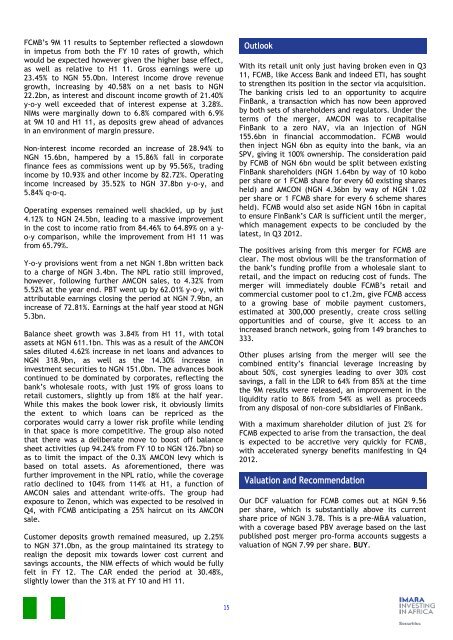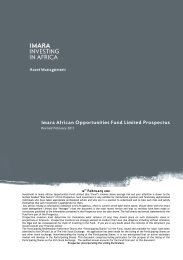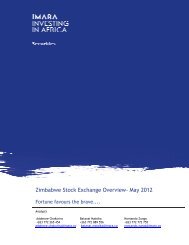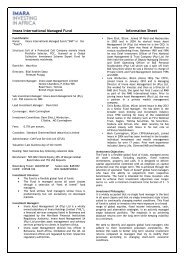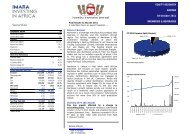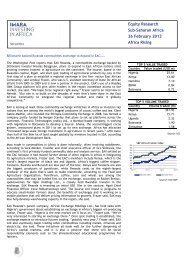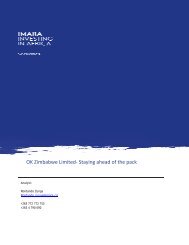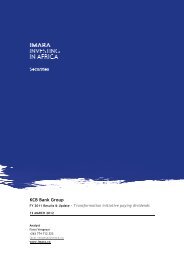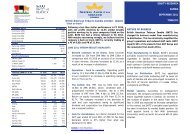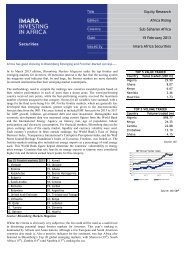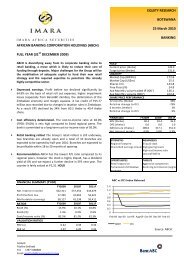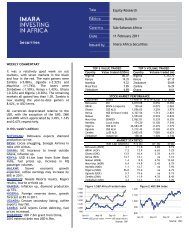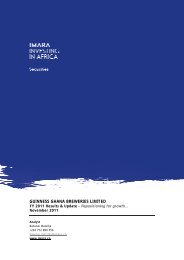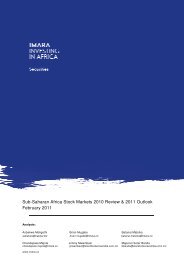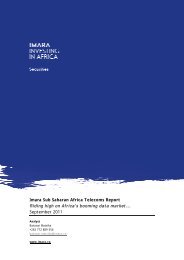Nigeria Banking Sector Coverage - December 2011 'Bad ... - Imara
Nigeria Banking Sector Coverage - December 2011 'Bad ... - Imara
Nigeria Banking Sector Coverage - December 2011 'Bad ... - Imara
You also want an ePaper? Increase the reach of your titles
YUMPU automatically turns print PDFs into web optimized ePapers that Google loves.
FCMB’s 9M 11 results to September reflected a slowdown<br />
in impetus from both the FY 10 rates of growth, which<br />
would be expected however given the higher base effect,<br />
as well as relative to H1 11. Gross earnings were up<br />
23.45% to NGN 55.0bn. Interest income drove revenue<br />
growth, increasing by 40.58% on a net basis to NGN<br />
22.2bn, as interest and discount income growth of 21.40%<br />
y-o-y well exceeded that of interest expense at 3.28%.<br />
NIMs were marginally down to 6.8% compared with 6.9%<br />
at 9M 10 and H1 11, as deposits grew ahead of advances<br />
in an environment of margin pressure.<br />
Non-interest income recorded an increase of 28.94% to<br />
NGN 15.6bn, hampered by a 15.86% fall in corporate<br />
finance fees as commissions went up by 95.56%, trading<br />
income by 10.93% and other income by 82.72%. Operating<br />
income increased by 35.52% to NGN 37.8bn y-o-y, and<br />
5.84% q-o-q.<br />
Operating expenses remained well shackled, up by just<br />
4.12% to NGN 24.5bn, leading to a massive improvement<br />
in the cost to income ratio from 84.46% to 64.89% on a y-<br />
o-y comparison, while the improvement from H1 11 was<br />
from 65.79%.<br />
Y-o-y provisions went from a net NGN 1.8bn written back<br />
to a charge of NGN 3.4bn. The NPL ratio still improved,<br />
however, following further AMCON sales, to 4.32% from<br />
5.52% at the year end. PBT went up by 62.01% y-o-y, with<br />
attributable earnings closing the period at NGN 7.9bn, an<br />
increase of 72.81%. Earnings at the half year stood at NGN<br />
5.3bn.<br />
Balance sheet growth was 3.84% from H1 11, with total<br />
assets at NGN 611.1bn. This was as a result of the AMCON<br />
sales diluted 4.62% increase in net loans and advances to<br />
NGN 318.9bn, as well as the 14.30% increase in<br />
investment securities to NGN 151.0bn. The advances book<br />
continued to be dominated by corporates, reflecting the<br />
bank’s wholesale roots, with just 19% of gross loans to<br />
retail customers, slightly up from 18% at the half year.<br />
While this makes the book lower risk, it obviously limits<br />
the extent to which loans can be repriced as the<br />
corporates would carry a lower risk profile while lending<br />
in that space is more competitive. The group also noted<br />
that there was a deliberate move to boost off balance<br />
sheet activities (up 94.24% from FY 10 to NGN 126.7bn) so<br />
as to limit the impact of the 0.3% AMCON levy which is<br />
based on total assets. As aforementioned, there was<br />
further improvement in the NPL ratio, while the coverage<br />
ratio declined to 104% from 114% at H1, a function of<br />
AMCON sales and attendant write-offs. The group had<br />
exposure to Zenon, which was expected to be resolved in<br />
Q4, with FCMB anticipating a 25% haircut on its AMCON<br />
sale.<br />
Customer deposits growth remained measured, up 2.25%<br />
to NGN 371.0bn, as the group maintained its strategy to<br />
realign the deposit mix towards lower cost current and<br />
savings accounts, the NIM effects of which would be fully<br />
felt in FY 12. The CAR ended the period at 30.48%,<br />
slightly lower than the 31% at FY 10 and H1 11.<br />
Outlook<br />
With its retail unit only just having broken even in Q3<br />
11, FCMB, like Access Bank and indeed ETI, has sought<br />
to strengthen its position in the sector via acquisition.<br />
The banking crisis led to an opportunity to acquire<br />
FinBank, a transaction which has now been approved<br />
by both sets of shareholders and regulators. Under the<br />
terms of the merger, AMCON was to recapitalise<br />
FinBank to a zero NAV, via an injection of NGN<br />
155.6bn in financial accommodation. FCMB would<br />
then inject NGN 6bn as equity into the bank, via an<br />
SPV, giving it 100% ownership. The consideration paid<br />
by FCMB of NGN 6bn would be split between existing<br />
FinBank shareholders (NGN 1.64bn by way of 10 kobo<br />
per share or 1 FCMB share for every 60 existing shares<br />
held) and AMCON (NGN 4.36bn by way of NGN 1.02<br />
per share or 1 FCMB share for every 6 scheme shares<br />
held). FCMB would also set aside NGN 16bn in capital<br />
to ensure FinBank’s CAR is sufficient until the merger,<br />
which management expects to be concluded by the<br />
latest, in Q3 2012.<br />
The positives arising from this merger for FCMB are<br />
clear. The most obvious will be the transformation of<br />
the bank’s funding profile from a wholesale slant to<br />
retail, and the impact on reducing cost of funds. The<br />
merger will immediately double FCMB’s retail and<br />
commercial customer pool to c1.2m, give FCMB access<br />
to a growing base of mobile payment customers,<br />
estimated at 300,000 presently, create cross selling<br />
opportunities and of course, give it access to an<br />
increased branch network, going from 149 branches to<br />
333.<br />
Other pluses arising from the merger will see the<br />
combined entity’s financial leverage increasing by<br />
about 50%, cost synergies leading to over 30% cost<br />
savings, a fall in the LDR to 64% from 85% at the time<br />
the 9M results were released, an improvement in the<br />
liquidity ratio to 86% from 54% as well as proceeds<br />
from any disposal of non-core subsidiaries of FinBank.<br />
With a maximum shareholder dilution of just 2% for<br />
FCMB expected to arise from the transaction, the deal<br />
is expected to be accretive very quickly for FCMB,<br />
with accelerated synergy benefits manifesting in Q4<br />
2012.<br />
Valuation and Recommendation<br />
Our DCF valuation for FCMB comes out at NGN 9.56<br />
per share, which is substantially above its current<br />
share price of NGN 3.78. This is a pre-M&A valuation,<br />
with a coverage based PBV average based on the last<br />
published post merger pro-forma accounts suggests a<br />
valuation of NGN 7.99 per share. BUY.<br />
15


